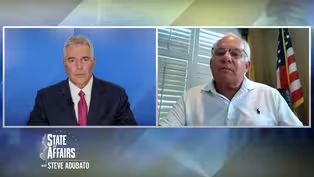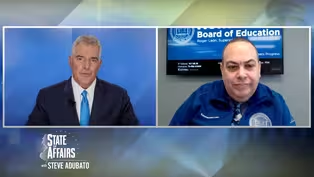State of Affairs with Steve Adubato
Asw. Muñoz Addresses the Nursing & Physician Shortage
Clip: Season 7 Episode 12 | 9m 30sVideo has Closed Captions
Asw. Muñoz Addresses the Nursing & Physician Shortage
Assemblywoman Nancy Muñoz (R), Deputy Minority Leader, sits down with Steve Adubato to address the nursing shortage, nurse and physician burnout, and the need for affordable, accessible childcare.
Problems playing video? | Closed Captioning Feedback
Problems playing video? | Closed Captioning Feedback
State of Affairs with Steve Adubato is a local public television program presented by NJ PBS
State of Affairs with Steve Adubato
Asw. Muñoz Addresses the Nursing & Physician Shortage
Clip: Season 7 Episode 12 | 9m 30sVideo has Closed Captions
Assemblywoman Nancy Muñoz (R), Deputy Minority Leader, sits down with Steve Adubato to address the nursing shortage, nurse and physician burnout, and the need for affordable, accessible childcare.
Problems playing video? | Closed Captioning Feedback
How to Watch State of Affairs with Steve Adubato
State of Affairs with Steve Adubato is available to stream on pbs.org and the free PBS App, available on iPhone, Apple TV, Android TV, Android smartphones, Amazon Fire TV, Amazon Fire Tablet, Roku, Samsung Smart TV, and Vizio.
Providing Support for PBS.org
Learn Moreabout PBS online sponsorship[INSPRATIONAL MUSIC STING] - Hi, everyone, Steve Adubato.
We kick off the program with a distinguished member of the state legislature, State Assemblywoman Nancy Muñoz is deputy minority leader.
That would mean, Assemblywomen, that's the minority leader, that's the Republican Party, right?
- Correct.
- Just checking.
- Minority that is the key there.
- Exactly, Assemblywoman, you've been with us many times, but in addition to your work as a state legislator, particularly focused on health care issues, 35 years as a nurse, fair, is that accurate?
- More than that as a nurse, but probably years working as a nurse, yes, that's accurate.
Actually, I graduated a long time ago, and I still have my nursing license.
- The most significant challenge facing the nursing profession today is?
- Right now the biggest challenge I believe is seeing, we have a tremendous shortage of nurses.
And having this tremendous shortage of nurses impacts the ability to deliver care, 'cause we simply don't have enough nurses.
I think COVID had an impact on it, people who were, you know, nearing retirement decided that it was time to retire, people were stressed out because of COVID, and young people aren't entering the profession.
The other problem we have, Steve, is that we probably don't have enough slots for professional nursing education in the state, which is an issue.
You know, I've been working, for the 14 years I've been in a legislature, on how we can help that issue.
You know, the community colleges are in a position to do the preliminary education of the nurses, the pre-science courses, the chemistry, the biologies, the microbiology, et cetera, and then transition into the baccalaureate program.
So, you know, we need a very coordinated and smooth transition from one to the other.
And I've actually worked with several of the community colleges, i.e.
Union County College, to allow them also to to grant a bachelor of science in nursing.
The courses would be the same, qualifications would be the same, they would take the same test.
So I think we need to be more flexible in our thinking on how we educate the nurses.
I'm a real strong believer in a bachelor of science in nursing should be what everyone should strive for, and I think that we can do it if we work together.
- The other issue that I think about, 'cause we've had so many health care leaders on talking about this, is the pay for nurses.
And that there are many who argue that these traveling nurses who are not staff nurses, they're getting paid so much more moving from hospital to hospital, hospital system to hospital system, on a day rate, or based on a day rate, that allows them to make more than if you were a staff nurse.
So the question becomes where's the incentive to be a staff nurse?
- That's a really good point.
Traveling nurse is not for everyone, obviously, because a lot of nurses, you know, have families and they need to be able to, you know, live near their family.
And the traveling nurse program actually lets you move around the state also.
And, you know, the traveling nurse program was set up initially so that we could fill in those slots where we had shortages, and then when they can overcompensate, meaning they pay much more.
You know, and I think we have to factor in, and I don't know the answer to this, you know, all the benefits that nurses get who work within the hospital system.
So, you know, you have to add in another 30% on, 33% on to your pay when you talk about benefits such as health care, and vacation time, et cetera, et cetera.
So we have to look at that.
You know, I've been a strong proponent that hospitals should offer continuing education for nurses who wanna get their bachelor's degrees, loan forgiveness programs for nurses who will come to work for them, especially in those hospitals that are in most in need, underserved areas such as, you know, our urban areas where we need more nurses.
You know, loan forgiveness programs, we do it in other professions, we do it in medicine, we do it in psychiatry, you know, we should be doing it in nursing as well.
You know, if you commit to five years in a underserved area, you know, we'll take off, you know, whether it's whatever the X number is per year off your student loans, that would incentivize nurses to come and stay.
- Real quick, follow-up on this, burnout, I mean, I think a lot about the issue of wellness, you know, and for physicians and nurses, how hard is it to calculate, Assemblywoman, the burnout factor?
Burnout is such a ridiculous word.
The impact, the psychological, emotional, physical impact of COVID on nurses.
- That's a really good question, because it really is hard to quantify.
And I think for every person its personal.
I believe that every, depends on how every institution handled the issue of Covid.
You know, I have lots of friends in nursing and a lot of places set up teams that I think that the teams worked together.
You know, they brought nurses who worked on the floors and brought them to the intensive care units, and they worked in four-member teams so that they had each other to depend on.
I think that people who were broad thinking and could actually look at ways to make sure that those people who don't have a background in intensive care nursing had the backup that they needed.
And I think that that's where we need to be as far as like supporting, you know, the new nurses with backup from longtime nurses to work collaboratively as a team rather than throwing people into a system that says like, you know, "Sink or swim."
And I really feel like that backup, that teamwork is integral to health care delivery.
'Cause, you know, the nurses and doctors, and all the health care professionals work together.
We should be looking at that and how we can better facilitate that to prevent that burnout.
- Real quick point before I ask you about child care.
Assemblywoman Muñoz volunteered during COVID, jumped in onto the front lines, if you will, to help out.
She's not gonna say that, but it needed to be said.
Nancy, let me ask you this, child care, our initiative Reimagine Child Care, the graphic goes up right now talking about the need for more affordable, accessible, quality child care.
How high a priority on your legislative agenda is this issue?
- You know, it's an issue I've definitely been working on for many years now.
And I think it is a priority if we wanna get people back to work.
You know, I put in a piece of legislation with Assemblywoman Pintor Marin, you know, who's from Newark.
- The Ironbound, that's right.
- It is, you know, to have child care available at the State House for those who work.
You know, how do we get more women into the legislature?
Partly by allowing them to be able to get to work.
So, you know, we're looking at all of these things.
You know, if we go back to health care, many hospitals figure out ways to provide child care at the facility if they have the room, which, you know, will bring us to the topic of hospitals having the ability, or any business, to provide access to child care.
And also we have to be mindful that most of the child care providers in this state are small businesses run by women.
And we must do everything we can to help these small businesses both in facilities and in ways that we tax people, and ways that we present this.
We wanna make sure the state doesn't move it away from these small businesses.
'Cause this is really a leg up for many, many people is to start a small business, and to succeed, and to be part of the solution to this issue.
- Next time we have the Assemblywoman with us.
we're gonna try to, we will not try to, we'll have a comprehensive conversation about the number of women who have left the state legislature, and the need to have more women involved in elective office, particularly in the state legislature.
Assemblywoman Nancy Muñoz, who is the deputy minority leader that is the deputy leader of the Republican Party in the State Assembly.
Thank you so much, Assemblywoman, we appreciate it.
- Thank you very much, thank you.
- Stay with us, we'll be right back.
- [Narrator] State of Affairs with Steve Adubato Is a production of the Caucus Educational Corporation.
Funding has been provided by Holy Name.
The Turrell Fund, supporting Reimagine Childcare.
New Jersey Sharing Network.
Horizon Blue Cross Blue Shield of New Jersey.
PSEG Foundation.
Operating Engineers, Local 825.
New Brunswick Development Corporation.
The New Jersey Economic Development Authority.
NJM Insurance Group.
And by these public spirited organizations, individuals and associations committed to informing New Jersey citizens about the important issues facing the Garden State.
And by Employers Association of New Jersey.
Promotional support provided by Northjersey.com and Local IQ.
And by Insider NJ.
- I am alive today thanks to my kidney donor.
I am traveling and more active than ever before.
- I'm alive today thanks to my heart donor.
I'm full of energy and back singing in my church choir.
- I'm alive today thanks to my lung donor.
I'm breathing easy and I'm enjoying life'’s precious moments.
- They are about 4,000 people in New Jersey waiting for a life-saving transplant.
- Donation needs diversity!
- For more information or to become an organ and tissue donor, visit NJSharingNetwork.org.
Former Senator Talks About the Need for a Third Party
Video has Closed Captions
Clip: S7 Ep12 | 9m 2s | Former Senator Talks About the Need for a Third Party (9m 2s)
Newark Superintendent Talks About Learning Loss From COVID
Video has Closed Captions
Clip: S7 Ep12 | 9m 23s | Newark Superintendent Talks About Learning Loss From COVID (9m 23s)
Providing Support for PBS.org
Learn Moreabout PBS online sponsorship
- News and Public Affairs

Top journalists deliver compelling original analysis of the hour's headlines.

- News and Public Affairs

FRONTLINE is investigative journalism that questions, explains and changes our world.












Support for PBS provided by:
State of Affairs with Steve Adubato is a local public television program presented by NJ PBS

